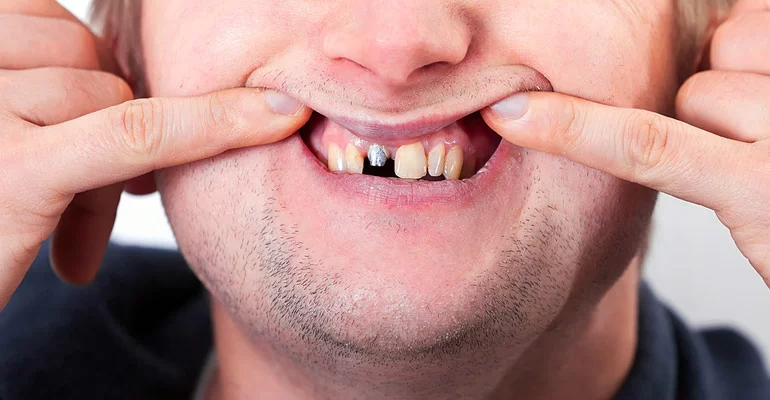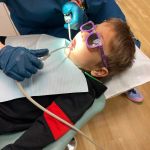
What to Do When a Dental Crown Falls Off
Imagine this: You're going about your day, enjoying a meal or even just sipping your coffee, and suddenly, you feel something strange in your mouth. Your dental crown, the one that has been protecting your tooth for years, falls off. Whether it's a result of wear and tear, a food-related incident, or just time, it can be an alarming experience. But don't panic! I've been there myself, and I'm here to guide you through what to do when a dental crown falls off.
1. Stay Calm and Check the Situation
The first thing to do when your crown falls off is to stay calm. It may feel like a catastrophe at first, but it's something that can be easily handled. Check the tooth to make sure that the underlying tooth is still intact and that there’s no pain or excessive sensitivity. If you feel any pain or notice that part of the tooth has broken off, it’s crucial to see a dentist as soon as possible. However, if the tooth is intact and you’re not in severe pain, you're in a much better situation than you might think!
2. Retrieve the Crown
If you can find the crown, hold onto it! You’ll need it when you visit the dentist. Sometimes, the crown might have fallen into food or onto the floor, so take a moment to search around. Once you've retrieved it, be sure to rinse it gently with water. Avoid using any soap, toothpaste, or cleaning solutions as they can damage the crown.
3. Protect the Tooth
After your crown falls off, the exposed tooth underneath can be sensitive. The good news is that you can protect the exposed tooth until you get to the dentist. If there is no pain, you can use dental cement or a temporary filling kit from a pharmacy. These kits are easy to use, and they'll help cover the exposed area, protecting it from further damage or discomfort. However, this is just a temporary solution and not a replacement for professional care.
4. Don't Try to Reattach the Crown Yourself
While it might be tempting to try to glue the crown back onto your tooth, I strongly advise against it. Using strong adhesives can damage both your tooth and the crown itself. Also, it’s likely that the fit won’t be right, and you'll need a professional to fix it anyway. It’s best to leave reattaching the crown to a dentist, who will ensure it’s done properly and securely.
5. Make an Appointment with Your Dentist
Once you've managed to protect your tooth and you're no longer in discomfort, it’s time to make an appointment with your dentist. A dentist can assess the situation and determine if the crown can be reattached or if a new one needs to be made. It’s important to get this checked out quickly to avoid any further complications like infections or damage to the tooth underneath.
In some cases, the crown may simply need to be cemented back into place. However, if the crown is damaged or worn out, you may need to have a new one made. This could take a little time, so in the meantime, your dentist may offer a temporary solution to protect the tooth.
6. Take Extra Care of Your Tooth While Waiting
If you're waiting for an appointment or for a new crown to be made, it's essential to take care of the exposed tooth. Avoid eating sticky, hard, or chewy foods that could further damage the tooth. Stick to soft foods that don’t put pressure on the exposed area. Additionally, practice good oral hygiene, brushing gently around the exposed area and avoiding any harsh cleaning products that could cause irritation.
7. Consider a Temporary Crown
If you're in a rush to get the issue fixed, talk to your dentist about getting a temporary crown. Temporary crowns can be a great short-term solution while you wait for your permanent crown to be made. These temporary options can help protect your tooth and maintain the appearance of your smile until the final restoration is ready. While they may not be as durable as the permanent solution, they’re much better than leaving your tooth exposed.
8. Avoid Future Issues
Once your dental crown is successfully reattached or replaced, it’s important to take steps to avoid the crown falling off again. Regular dental check-ups will ensure that your crown remains in good condition. Additionally, avoid chewing on extremely hard foods like ice or hard candy, as these can cause the crown to loosen over time. Keeping your teeth and gums healthy through proper brushing and flossing is also vital for maintaining the integrity of your dental work.
While it might be an inconvenient situation, having a crown fall off doesn’t have to be the end of the world. By staying calm, taking temporary precautions, and visiting your dentist as soon as possible, you can get back on track with minimal hassle.







 Cascade Orthodontics4.0 (621 review)
Cascade Orthodontics4.0 (621 review) Lino Lakes Family Dentistry5.0 (110 review)
Lino Lakes Family Dentistry5.0 (110 review) Aspen Dental - Springfield, MO4.0 (563 review)
Aspen Dental - Springfield, MO4.0 (563 review) Mountainside Dental Group - Rancho Santa Margarita4.0 (117 review)
Mountainside Dental Group - Rancho Santa Margarita4.0 (117 review) Smile Design Studio Of Hyde Park LLC4.0 (367 review)
Smile Design Studio Of Hyde Park LLC4.0 (367 review) Harmony Dental Health4.0 (259 review)
Harmony Dental Health4.0 (259 review) The Importance of Oral Health Education During Pregnancy for a Healthy Pregnancy
The Importance of Oral Health Education During Pregnancy for a Healthy Pregnancy Best Tips for Brushing Your Teeth Properly for Healthy Gums: Essential Techniques for Oral Health
Best Tips for Brushing Your Teeth Properly for Healthy Gums: Essential Techniques for Oral Health Why Skipping Dental Checkups Can Lead to Bigger Oral Health Problems
Why Skipping Dental Checkups Can Lead to Bigger Oral Health Problems Advantages of Porcelain Dental Restorations
Advantages of Porcelain Dental Restorations How Can Diabetes Cause Tooth and Gum Problems? Preventing and Managing Oral Health Issues
How Can Diabetes Cause Tooth and Gum Problems? Preventing and Managing Oral Health Issues Healthy Habits for Promoting Good Oral Health and Hygiene: Tips for a Healthy Smile
Healthy Habits for Promoting Good Oral Health and Hygiene: Tips for a Healthy Smile